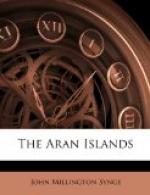‘There’s a mistake in the English,’ he said, after a moment’s hesitation, ‘he’s put “gold chair” instead of “golden chair."’
I pointed out that we speak of gold watches and gold pins.
‘And why wouldn’t we?’ he said; ’but “golden chair” would be much nicer.’
It is curious to see how his rudimentary culture has given him the beginning of a critical spirit that occupies itself with the form of language as well as with ideas.
One day I alluded to my trick of joining string.
‘You can’t join a string, don’t be saying it,’ he said; ’I don’t know what way you’re after fooling us, but you didn’t join that string, not a bit of you.’
Another day when he was with me the fire burned low and I held up a newspaper before it to make a draught. It did not answer very well, and though the boy said nothing I saw he thought me a fool.
The next day he ran up in great excitement.
‘I’m after trying the paper over the fire,’ he said, ’and it burned grand. Didn’t I think, when I seen you doing it there was no good in it at all, but I put a paper over the master’s (the school-master’s) fire and it flamed up. Then I pulled back the corner of the paper and I ran my head in, and believe me, there was a big cold wind blowing up the chimney that would sweep the head from you.’
We nearly quarrelled because he wanted me to take his photograph in his Sunday clothes from Galway, instead of his native homespuns that become him far better, though he does not like them as they seem to connect him with the primitive life of the island. With his keen temperament, he may go far if he can ever step out into the world.
He is constantly thinking.
One day he asked me if there was great wonder on their names out in the country.
I said there was no wonder on them at all.
‘Well,’ he said, ’there is great wonder on your name in the island, and I was thinking maybe there would be great wonder on our names out in the country.’
In a sense he is right. Though the names here are ordinary enough, they are used in a way that differs altogether from the modern system of surnames.
When a child begins to wander about the island, the neighbours speak of it by its Christian name, followed by the Christian name of its father. If this is not enough to identify it, the father’s epithet— whether it is a nickname or the name of his own father—is added.
Sometimes when the father’s name does not lend itself, the mother’s Christian name is adopted as epithet for the children.
An old woman near this cottage is called ‘Peggeen,’ and her sons are ‘Patch Pheggeen,’ ‘Seaghan Pheggeen,’ etc.
Occasionally the surname is employed in its Irish form, but I have not heard them using the ‘Mac’ prefix when speaking Irish among themselves; perhaps the idea of a surname which it gives is too modern for them, perhaps they do use it at times that I have not noticed.




